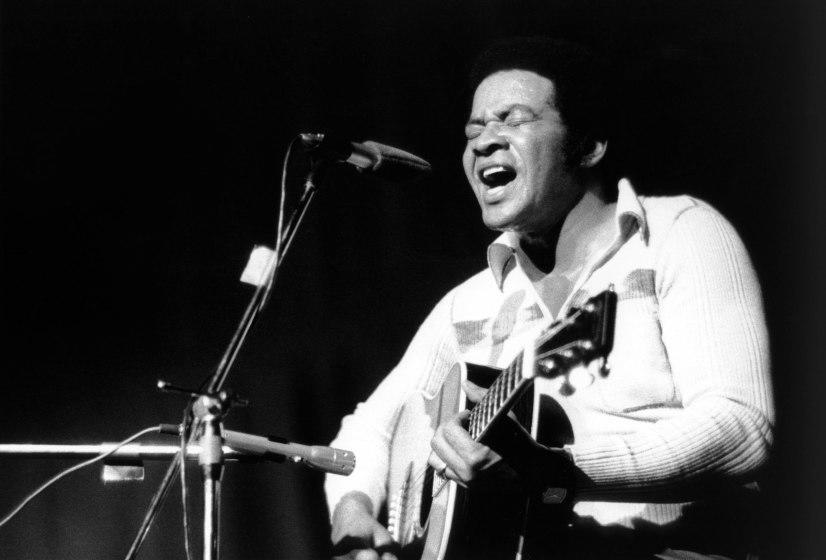Bill Withers' 10 greatest songs

Bill Withers, who died on Monday at age 81, had a gift for plain-spoken deep feeling. He was a craftsman whose connection to everyday stuff — loneliness, mercy — came through indelibly. Some soul has dirt on it, but this had dust — his music floated and held you with a few fingers on a keyboard or an acoustic guitar.
At what was probably his last public appearance, in late February, he gloriously crashed a panel discussion of Chuck Berry at the Grammy Museum. He talked about what he knew best — namely, Bill Withers — and showed how the stuff he put into his songs wasn’t old to him; he was still feeling those same wishes and resentments on stage that night as when he debuted in 1971.
Here are 10 — OK, 11, we couldn't choose — of the best Bill Withers songs.
“Ain’t No Sunshine” (1971)
A bulletin from the heart, he interrupted your regularly scheduled life on his debut to bring you the news: You want what you can’t have and sometimes you can’t have it for very good reason: it isn’t good for you. And it goes on forever — beyond the 26 times he sang “I know,” beyond the span of a career. This folk-soul song will outlast us all.
“Grandma’s Hands” (1971)
As a kid in Slab Fork, W.Va., Withers would go to church with his mother’s mother and watch her hands as she clapped to the music. This is a shocking song about missing those days — a grandmother whose hands kept harm from coming to a little boy, and the boy grown up now, knowing he is on his own in the world.
“Lean on Me” (1972)
Back in 1972 this felt like a welcome drop of the familiar soul man’s macho mask — “please swallow your pride,” he sang, and he showed his own vulnerability as he reached out to help a friend, or a listener, who needed it. His fingers picking out a few notes on the keyboard, it sounds like searching for hope. Today “Lean on Me” has a new resonance as a shout-along in our rooms to everybody dealing with a pandemic.
“Use Me” (1972)
On his second album "Still Bill," Withers was working with the Watts 103rd Street Rhythm Band, an acidic L.A. funk crew that had to downshift to a backing band — its funk slithers like an unannounced visitor that knows how to hustle through the door. Withers weighs the economy of love — what a given relationship is worth, what it will cost him, and he slithers on down in its direction until it burns away.
“Who Is He (and What Is He to You?)” (1972)
It’s a sketch turned into a world, some stranger buzzing around the singer and his partner like this guy knows some things. And like the singer may not. The bass line is the sound of a hunt, the words are steeped in paranoia.
“I Can’t Write Left-Handed” (1973)
As direct and up-close a song about the Vietnam War as anybody ever figured out how to write. “One big drag,” he exhales about the war — but he says he’s not singing about “social things,” just “young guys who were like I was when I was young.” He goes in full gospel mode here to describe a soldier now home trying to write a letter to his mother. That cinnamon pulpit voice, a few choice blue notes from the guitar — Bill Withers quietly preached.
“Harlem”/”Cold Baloney” (1973)
Live at Carnegie Hall, and he’s singing about Saturday night and Sunday morning in Harlem, and bringing the live audience with him: “I want to tell you about cold baloney, all by myself,” describing growing up poor while the music is ramping up and up and up, pulling you through a scene as full of life as an Ossie Davis movie or a Jacob Lawrence painting.
“Liza” (1974)
A word pops out of his spoken intro: “Affection.” That’s one you don’t hear much in pop music, and there’s so much of it in his music. Maybe more here than even usual, in this spare lullaby to a niece. It’s just Withers and a keyboard, as he gives her comfort for feelings she hasn’t even felt yet: “I know what it means to need a shoulder, so lay your head on mine.”
“Make Love to Your Mind” (1975)
A great lesser-known song about romance and songwriting. “I love the story in your love song,” he sings to a woman he’s warming up to. And he wants to hear the story first — the talk, the dream, that comes before anything physical. It’s a good '70s funk track and a superb plea to live a bit longer in the world of dreams and words before the real world takes us where it wants to go.
“It’s All Over Now” (1975)
This duet with fellow all-too-knowing West Coast soul man Bobby Womack is a satisfying outlier in Withers' career, a buddy team blastoff on the Rolling Stones hit. While the Stones did it as a studly kiss-off, the tone here is pure yippee, wailing guitars and a big old shrug. “Did that really happen?” they laugh, as their limo pulls out onto Crenshaw Boulevard and heads off into the night.
“Just the Two of Us” (1980)
It got hard to be Bill Withers. His last major song was a reach back in time when things weren’t so complicated. Grover Washington Jr.’s sax and a steel pan play you to a beach, blanket for two, a musical safe haven where he could build “castles in the sky.” It’s a karaoke standard that Eminem sampled and Bill Cosby and Mike Myers parodied.

